Promoting Akbash Dog Breed Worldwide
Dedicated to Akbash Dogs and other rare Livestock Guardian breeds
The Akbash Dog, a remarkable livestock guardian breed, deserves recognition and promotion on a global scale. By focusing on education, training, and partnerships, we can raise awareness about the unique traits and benefits of Akbash dogs and other rare breeds that excel in protecting livestock. Through workshops, informational campaigns, and collaboration with farmers and animal welfare organizations, we aim to demonstrate the importance of these guardian breeds in sustainable agriculture. By sharing best practices in training and care, we can empower farmers to adopt and effectively utilize these dogs, ensuring the safety and well-being of their herds. Together, we can foster a deeper appreciation for these exceptional animals and their invaluable role in preserving traditional farming methods while promoting biodiversity in livestock guardianship.
What type of Fencing should I have?
The following is a summary of Paper #1358, USDA National Wildlife Research Center – Staff Publications. See Human–Wildlife Interactions 5(1):106–111 to access the entire article by Thomas Gehring, Kurt Vercauteren and Anna Cellar.
1. Assess existing fencing on the livestock farm. Add additional electric wire if needed, and ensure bottom wire is no higher than .25 meter from the ground. Alternatively, use an invisible-fence system, woven wire or wovenelectric net fencing. Electric fencing and invisible fencing is most desirable to prevent LPDs from digging under the fence to escape.
2. Establish a fence boundary by walking LPDs on a leash around a pasture’s perimeter and to never allow them to pass through a fence/gate unless on a leash. Making a LPD’s first experience with the fence a negative one is important to prevent roaming activities. Their first experience with an electrified fence should involve walking them (on a leash) around the pasture perimeter and allowing the dog to investigate the fence and receive a shock, followed by continued walking and shocking. To reinforce aversion to fencing, producers should walk LPDs daily around the pasture for several weeks, with corrective shocking, before releasing them into the pasture. When and LPD demonstrates great resistance to being forced near fencing, they are properly conditioned.
3. If roaming behavior does develop, producers should change immediately to an invisiblefence, in lieu of culling, to correct this behavior.
4. Regardless of fencing considerations, producers must be genuinely interested in using LPDs and invest fully in the training of the dogs.
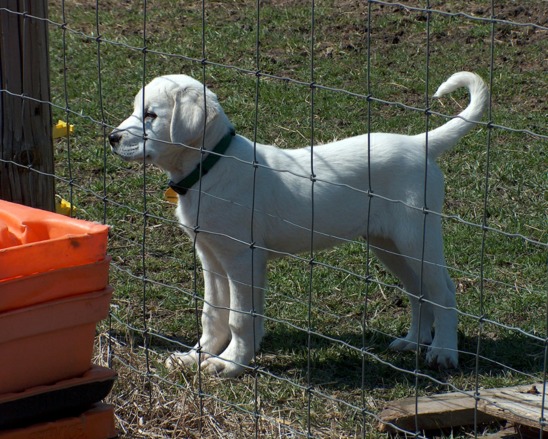

Photo by Diane Spisak
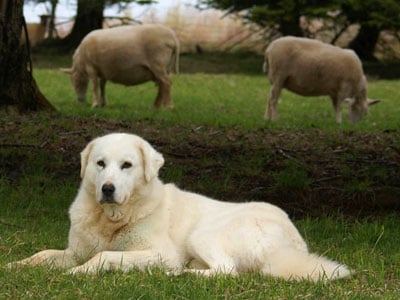

Should I socialize my livestock guardian pup?
Yes, it is important to socialize your livestock guardian pup. You should at least handle and teach the basics such as coming when called, walking on a leash without pulling, sitting, lying down, staying back, taking it easy, and being okay with riding in a car. By socializing your pup, you can help them become more adaptable and better behaved in different situations, making them a more effective and well-rounded livestock guardian. It also helps to build a strong bond between you and your pup, fostering trust and cooperation. Socialization is an important part of raising a well-adjusted and well-behaved livestock guardian dog.
Do they need regular nail trimming?
Yes, it is important to keep your dog's nails at a good length in order to allow them to move more athletically and stay healthy. Long nails can hinder a dog's movement and cause discomfort or even injury. Keeping their nails trimmed to a proper length is essential for their overall well-being and mobility. Regular nail maintenance can also prevent issues such as ingrown nails or infections. It is important to pay attention to your dog's nails and ensure they are kept at an appropriate length to support their agility and comfort.
How important is spaying & neutering?
Spaying and neutering are incredibly important for the well-being and behavior of dogs, especially for livestock guardian dogs. Neutering these dogs can help them stay near the flock and continue to work effectively. Additionally, intact dogs may require confinement when the female is in heat, which can be a hassle and cause disruptions in their work. By spaying and neutering, we can not only prevent unwanted litters, but also improve the overall behavior and focus of these working dogs, ensuring they can continue to fulfill their important role in protecting and herding livestock.
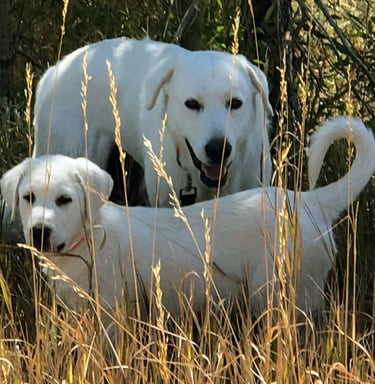

What training does a working pup need?
Training a working livestock guardian pup is crucial for their success in protecting the livestock. It is important to monitor and shape their good behaviors from an early age, including correcting any mouthing or chasing tendencies. Starting with basic obedience training, such as sit, stay, and come, is essential for establishing a strong foundation. Socialization with other animals and people is also important to ensure the pup is comfortable and confident in various situations. Additionally, introducing the pup to the livestock they will be guarding and teaching them to differentiate between friend and foe is crucial. Consistent and positive reinforcement training methods will help the pup understand their role and develop the necessary skills to effectively protect the livestock. Overall, patience, consistency, and a good understanding of the specific needs of livestock guardians are key in training a working pup.
When can I expect the pup to be big enough to guard effectively?
Livestock guardian puppies may appear to be big enough to protect the livestock, but in reality, they need to be 1-2 years old before they are mature enough to effectively guard the animals. It is important to be patient and allow the puppies to reach the appropriate age before expecting them to take on the role of protector. Rushing this process could result in the animals not being adequately protected, so it is best to wait until the puppies have reached the appropriate level of maturity. Once they are mature enough, they will be able to effectively fulfill their role as livestock guardians and provide the necessary protection for the animals.
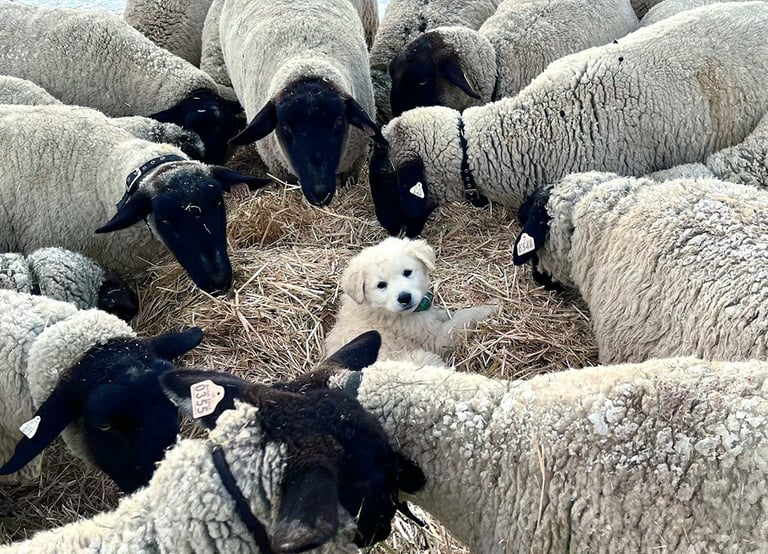

My dog digs what can I do about it?
Livestock guardian dogs are known for their digging behavior, as it is an instinctual behavior to create a den for themselves and to protect their territory. However, if the digging becomes excessive or destructive, there are a few things you can do to help curb this behavior. Providing your dog with plenty of exercise and mental stimulation can help reduce their need to dig. Additionally, creating a designated digging area for your dog, such as a sandbox or specific section of the yard, can help redirect their digging behavior. It's also important to ensure your dog is getting enough attention and socialization, as boredom and loneliness can lead to destructive behaviors. Lastly, consider consulting with a professional dog trainer or behaviorist for personalized advice and training techniques to address your dog's digging behavior.
How can I train my dog to protect chickens?
Training a livestock guardian dog to protect chickens requires patience and consistency. Start by socializing the dog with the chickens and establishing a bond of trust. Use positive reinforcement and reward the dog for exhibiting protective behavior around the chickens. Gradually introduce the dog to the chickens in a controlled environment and monitor its interactions. Teach the dog basic obedience commands and reinforce the concept of guarding the chickens through specific training exercises. It is important to provide the dog with a comfortable and secure living space near the chickens and to supervise its interactions with the flock until it has fully grasped its role as a protector. With time and dedication, the livestock guardian dog can be trained to effectively safeguard the chickens from potential threats.
My dog is chasing and biting my lambs. What can I do?
It sounds like your livestock guardian dog is displaying aggressive behavior towards your lambs, which is concerning. It's important to address this issue immediately for the safety of your lambs and the effectiveness of your guardian dog. First, you should consult with a professional dog trainer or behaviorist who has experience working with livestock guardian dogs. They can help assess the situation and provide guidance on how to train and manage your dog's behavior. It's also important to ensure that your dog is receiving proper exercise, mental stimulation, and socialization to prevent boredom and frustration. Additionally, consider separating the dog from the lambs until the behavior is under control. Remember, the safety and well-being of your livestock should always be the top priority.
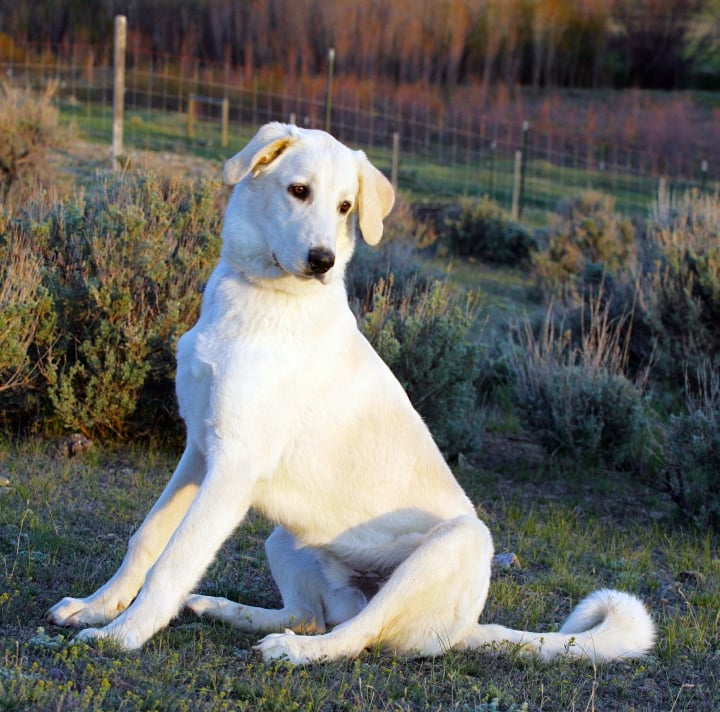

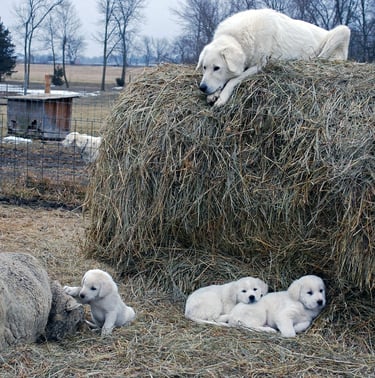

How hard is to train my new pup?
Training your livestock guardian dog involves consistent and positive reinforcement. When you notice good behavior, such as guarding the livestock and following commands, be sure to reward your dog with treats or praise. This will reinforce the behavior and encourage them to continue. Likewise, when you see bad behavior, such as being aggressive towards the livestock or ignoring commands, it's important to redirect their behavior and provide a correction. This could involve using a firm "no" command and then redirecting them to a more appropriate behavior. It's important to be patient and consistent with your training, as livestock guardian dogs are independent and strong-willed animals. With time and dedication, you can train your dog to be an effective guardian and a valuable member of your livestock operation.
Can an Akbash Dog make a good companion dog?
Livestock guardian dogs, such as the Akbash Dog, are known for their protective and independent nature. While they excel at protecting livestock in rural settings, they can also make great companion dogs in the right environment. These dogs are loyal, intelligent, and affectionate, making them suitable for families with a large yard or a rural lifestyle. However, they may not be the best choice for apartment living or urban environments due to their size and need for space to roam. With proper socialization and training, a livestock guardian dog can become a loving and loyal companion, but it's important to understand and respect their natural instincts and behaviors. Overall, with the right owner and living situation, a livestock guardian dog can indeed make a good companion dog.
Where should my dog stay at night?
Livestock guardian dogs should ideally stay with their flock at night. These dogs are specifically bred and trained to protect the livestock from predators, so it is important for them to be close to the animals they are guarding. This not only helps to ensure the safety of the flock, but also helps to establish a strong bond between the dog and the animals it is protecting. By staying with the flock, the livestock guardian dog can quickly respond to any potential threat and deter predators from approaching. Additionally, the presence of the dog can provide a sense of security and comfort to the livestock, helping to minimize stress and anxiety. Therefore, it is recommended for livestock guardian dogs to stay with their flock at night to fulfill their role effectively.
Partnerships
Breeders and owners through education and collaboration.
contact@akbashdogs.org
Partners@AkbashDogs.org
© 2024. All rights reserved.
Supporting
Rescue
Rescue@AkbashDogs.org
